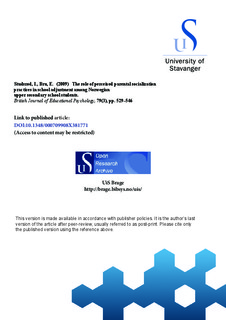| dc.contributor.author | Studsrød, Ingunn | |
| dc.contributor.author | Bru, Edvin | |
| dc.date.accessioned | 2016-05-03T11:10:38Z | |
| dc.date.available | 2016-05-03T11:10:38Z | |
| dc.date.issued | 2009-09 | |
| dc.identifier.citation | Studsrød, I., Bru, E. (2009) The role of perceived parental socialization practices in school adjustment among Norwegian upper secondary school students. British Journal of Educational Psychology , 79(3), pp. 529–546 | nb_NO |
| dc.identifier.uri | http://hdl.handle.net/11250/2388364 | |
| dc.description | This is an accepted version of an article originally published in the British Journal of Educational Psychology; see Studsrød, I. and Bru, E. (2009), The role of perceived parental socialization practices in school adjustment among Norwegian upper secondary school students. British Journal of Educational Psychology, 79: 529–546. doi: 10.1348/000709908X381771 | nb_NO |
| dc.description.abstract | Background. Lack of adjustment or school failure is a concern to educators, educational and school psychologists as well as parents, but few studies have focused on school adjustment during late adolescence. Moreover, studies have yet to explore associations between parenting and school adjustment among upper secondary school students.
Aim. The primary objective of this study is to explore the relative and unique influence of parental support, behavioural control and psychological control (overprotection and autonomy granting) in school adjustment among upper secondary school students.
Sample. The sample consisted of 564 students (15–18 years of age) in vocational and general educational courses from one upper secondary school in western Norway.
Method. The study was conducted as a survey. All data were based on adolescent reports, except for absence data, which were provided by the school.
Results. The results showed that perceived parental practices accounted for moderate, but statistically significant amounts of variance in different aspects of school adjustment.
Conclusions. The findings indicate that perceived parental socialization practices are only moderately associated with school adjustment among upper secondary school students. This probably reflects the fact that the influence of specific parenting practices declines as children and young adolescents mature into late adolescent students. | nb_NO |
| dc.language.iso | eng | nb_NO |
| dc.publisher | The British Psychological Society | nb_NO |
| dc.subject | utdanningsvitenskap | nb_NO |
| dc.subject | psykologi | nb_NO |
| dc.subject | foreldreinvolvering | nb_NO |
| dc.subject | skole | nb_NO |
| dc.subject | foreldrestøtte | nb_NO |
| dc.subject | skoleungdommer | nb_NO |
| dc.title | The role of perceived parental socialization practices in school adjustment among Norwegian upper secondary school students | nb_NO |
| dc.type | Journal article | nb_NO |
| dc.type | Peer reviewed | nb_NO |
| dc.rights.holder | © 2009 The British Psychological Society | nb_NO |
| dc.subject.nsi | VDP::Social science: 200::Psychology: 260 | nb_NO |
| dc.source.pagenumber | 529–546 | nb_NO |
| dc.source.volume | 79 | nb_NO |
| dc.source.journal | British Journal of Educational Psychology | nb_NO |
| dc.source.issue | 3 | nb_NO |
| dc.identifier.doi | 10.1348/000709908X381771 | |
